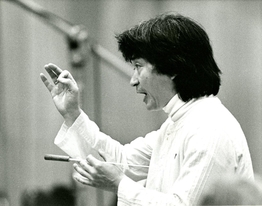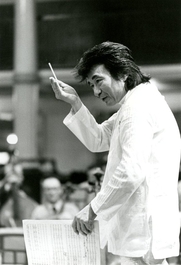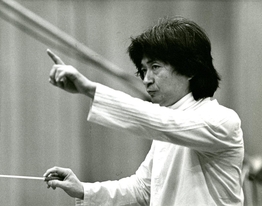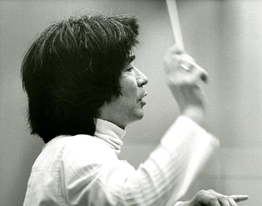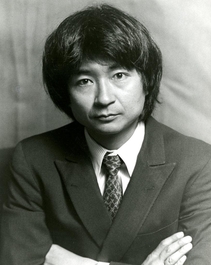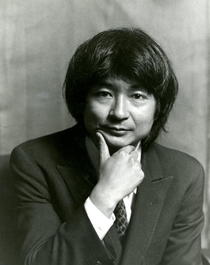

Seiji Ozawa
News
Happy 80th birthday, maestro Seiji Ozawa!
Seiji Ozawa has always had a unique bearing at the podium, as he seems to inject an element of martial arts into the art of conducting. His mop of black hair (now turned silver), his high and wide cheekbones, his body given over to a complex play of tension and flexion, but still supple and elastic: celebrating his 80th birthday today, Ozawa continues to cut a striking figure.
He is also a strong personality who was from an early age surrounded by musical fairy godmothers. He started off learning the piano, but an accident prompted him to look to conducting as an alternative career option. He studied conducting with the great cellist and pedagogue Hideo Saito, whose Toho Gakuen music school introduced modern methods of teaching classical music to Japan. After a stint spent studying with Eugène Bigot in Paris, Ozawa won first prize at the Besançon international conducting competition in 1959. Charles Munch, who was a member of the jury, then invited Ozawa to study with him in Boston.
At the same time, the great Herbert von Karajan summoned him to Berlin. Ozawa has emphasised the vital importance of the training he received in Tanglewood from 1960: "I discovered my own musical personality there, I was able to dream and take risks, surrounded by Munch, Copland and Bernstein." The flamboyant Music Director of the New York Philharmonic, Leonard Bernstein, offered Ozawa a job as his assistant - an offer sealed with obligatory beers and whiskies in Berlin. He is also the first and only Japanese conductor to have been Music Director of the Vienna State Opera (2002-10).
Though cancer of the oesophagus forced him to cut down his activities from 2010, he made a partial return to public life in 2013, remarking then that he intended to do his utmost to avoid dying.
Whatever the repertoire, Ozawa brings his supple and dynamic style to bear on the music. There is never any hint of heaviness in his approach, not even when he is working with mighty ensembles such as the Chicago and Berlin orchestras. His impetuous rendering of Scheherazade with the Chicago Symphony and his Tchaikovsky recordings with the Berlin Philharmonic are typical in this respect. Quite apart from their rhythmic impact, they demonstrate a quality that Ozawa has in common with the greatest conductors: he encourages each orchestra to project its own distinctive sound.
The fact that he chose to record George Gershwin with the Berlin Philharmonic may raise a few eyebrows; however, during his time in New York, the young Ozawa visited the great jazz clubs and in 1962 he conducted the string section of the New York Philharmonic in the music for the film Tracks in the Sand, in which he accompanied the jazz musicians Yusef Lateef, Tommy Flanagan and Max Roach - which must be his least well-known recording! A rare recording of the violin concertos by Earl Kim and Robert Starer is included in his 80th birthday boxed set, alongside Bernstein's Plato-inspired Serenade and Samuel Barber's lusciously romantic violin concerto - all played by no less a figure than Itzhak Perlman.
The French repertoire is undoubtedly particularly close to Ozawa's heart. He conducted the French premiere of Messiaen's Sept Haikai in 1966, and has long been closely associated with the Turangalîla-Symphonie; in 1983, he gave the world premiere of Messiaen's operatic masterpiece Saint-François d'Assise at the Paris Opera. He also conducted the first performance of Dutilleux's Le Temps l'horloge - with Renée Fleming and the Orchestre National de France - at the Théâtre des Champs-Elysées in 2009. And those who heard his performance of Ravel's La Valse in 1985, in the same venue and with the same orchestra, will certainly never forget the experience.
Another aspect of Ozawa's recorded legacy also deserves to be mentioned: in addition to the Perlman recordings already referred to, and others in which he accompanies Alexis Weissenberg and Anne-Sophie Mutter, there are a number of works played by Mstislav Rostropovich: Dvořák, Tchaikovsky, Prokofiev, Shostakovich, Shchedrin and Gagneux - a varied offering that demonstrates the Russian cellist's amazingly wide-ranging musical tastes as much as it does the adaptability of Ozawa, the perfect musical partner. Ozawa regards Slava as an older brother, in the same way as he sees Yo-Yo Ma as a younger brother.
Curiosity, friendships and elective affinities: these are surely the things that have influenced Seiji Ozawa's choices throughout his dazzling career.
Rémy Louis (Translation: Paula Kennedy)
Seiji Ozawa: the Complete Warner Recordings is out now in a lavish 25-CD boxed set.
Warner Classics celebrates Seiji Ozawa's 80th birthday with milestone boxed set
The set places an emphasis on Seiji Ozawa’s mastery of the colourful, large-scale orchestral scores of the 19th and 20th centuries and on his collaboration with such soloists as Itzhak Perlman, Anne-Sophie Mutter and Mstislav Rostropovich.
The scope of the 25 CDs is wide – from mainstays of the Romantic repertoire to modernist masterpieces and works premiered as recently as 1997 – and the recordings reflect Ozawa’s status as a global maestro and his relationship with a number of the world’s finest orchestras, including the Boston Symphony Orchestra (of which he was Music Director for 29 seasons), Chicago Symphony Orchestra and Berliner Philharmoniker. Among the composers featured in the collection are Tchaikovsky, Rimsky-Korsakov, Stravinsky, Prokofiev, Shostakovich, Bartók, Sibelius, Dvořák, Janáček, Lutosławski, Bizet, Saint-Saëns, Ravel, Dutilleux, Gershwin, Barber, Bernstein and Takemitsu.
Seiji Ozawa was born in 1935 into a Japanese family living in China and trained at the Toho School of Music in Tokyo. He came to international attention when he won the Besançon Conducting Competition in France in 1959, after which he was invited to Boston, where he studied with Charles Munch and Pierre Monteux, winning the Koussevitzky Prize in 1960. He subsequently received a scholarship to study in Berlin with no less a maestro than Herbert von Karajan. In 1961, another luminary of comparable brilliance, Leonard Bernstein, recruited Ozawa to be Assistant Conductor of the New York Philharmonic (1961), and he made his professional debut in 1962 with the San Francisco Symphony.
Over his career, Ozawa, who is known for his very physical conducting style and his preference for conducting without a score, has also been Music Director of the Vienna State Opera, Toronto Symphony Orchestra and San Francisco Symphony, Artistic Director of the Tanglewood Festival and Music Director of the Chicago Symphony Orchestra’s Ravinia Festival. He has also enjoyed close associations with such institutions as the Vienna Philharmonic Orchestra and the Paris Opéra. In Japan, he is Artistic Director of the Saito Kinen Orchestra, which he formed in 1984, and of the Saito Kinen Festival.
Ozawa was diagnosed with cancer of the oesophagus 2010, but, following successful surgery, he has returned to conducting and continues to mentor young musicians.
Seiji Ozawa: The Complete Warner Recordings is available now in a 25-CD boxed set.
